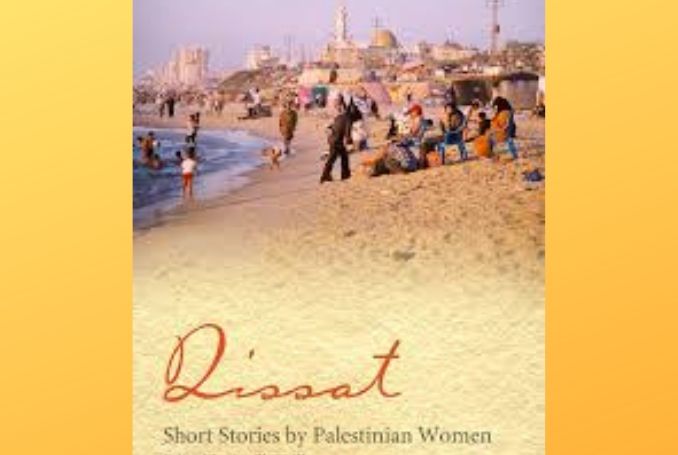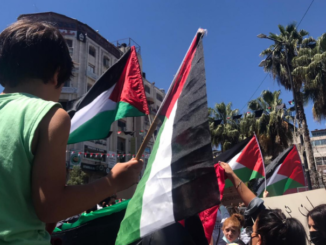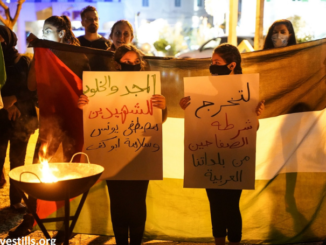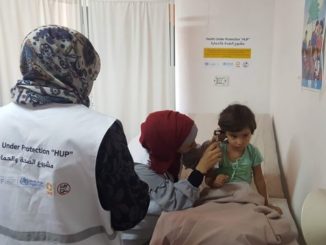
(Qissat: Short Stories by Palestinian Women Paperback. Jo Glanville, Editor. Telegram: May 1, 2007.)
Me (the Bitch) and Bustanji, Selma Dabbagh
We return to another story of a half-Palestinian in Kuwait by perhaps the most recognizable name in Qissat, Selma Dabbagh. We see flash from Dabbagh’s narrator a sharper, more poetic style than the others so far, whose stories’ strength is their unadulterated and unadorned tone. (Think, though it is not as popular as it once was to do so, Hemingway). For a start, we have our first metaphor for the sake of metaphor unlike, for instance, Nuwaar’s “salep cream” back with its sensuous target. The narrator’s “angry pen,” of which we can feel the emotional residue in this retrospective story of “the Bitch’s” family’s exile from Kuwait, has “dented the cover of” “the Bitch’s” diary “into a moronic teenage Braille.” The pages are lined with observations of “The Bitch’s” Palestinian neighbor, Bustanji, who decides to stay in Kuwait rather than leave and is later found to have had his son Waleed kidnapped and murdered during the Iraqi-led Palestinian pogrom.
The narrator, “the Bitch,” is quite sharp. She calls herself “bitch” because it’s the name given to her by the men who harass her out of doors, “Bitch, hey Bitch, yeah Bitch, I can see you. Bitch.” Next to her friend Nada, she finds her “prettiness” to be “so fat-soluble. It looks as though always on the verge of being dissolved away forever.” Her insights are no less keen, as she notes her father’s obsession with India, and his secretly liking “something about English colonialism.” (Escapism in being absorbed in a separate Occupation, this time won out by the occupied population). Remembering the photo of a murdered South American teen, “the Bitch” is poignant, “the jeans got me. He had woken up that morning not knowing he would die in them. The enormity of young death lay in the stitching on the back pockets.”
It’s always a delight when a first-generation English speaker can use the language in ways “native”-speakers wouldn’t think, and Dabbagh, who was born in Scottland (this could explain it, as those in the United Kingdom are often much better with the English language than Americans) provides this enjoyment too, describing one Iraqi soldier at the border as sporting a “bum-fluff” mustache, and another with a pistol “poppered into a painted leather pouch.” (Emphasis mine. Incidentally, a red line appears under “poppered” as I type it. Catch up I say, this is not the “popper” you may be thinking of).
Questions of identity abound. Considering identification, what nationality would be best when crossing the border? “The Bitch” is half-British, by citizenship, not ethnicity as her mother is from “Romania or is it Hungary?” “What nationality did we want to be? Who was whose enemy? Who were we?” Sitting with family from Palestine during the first days of Hussein’s invasion of Kuwait as family passports are being anxiously forged, an uncle questions why they should have to leave at all. Referencing the Kuwaitis, he says “These people… they gave us everything. We cannot leave them now.” “The Bitch’s” father responds, “They gave us everything? We, we the Palestinians built this place for them, schools, hospitals, ministries, the whole lot. ‘They gave us everything?’ How is that then?” To anyone a little lost here, I’d refer you to Andrew Ross’s work Stone Men: The Palestinians Who Built Israel, with its revelatory and fortified argument that Palestinians built not only Israel in an Apartheid fashion with their rich limestone deposits and cheap, skilled labor, but every state in the Gulf – except, of course, their own. This is a reality the Palestinian Solidarity Movement’s rhetoric and arguments is still catching up to. Not everyone has read their Dabbagh.
To these Palestinian immigrants, Kuwait is their home, just like Palestine was (and, legally, is) to the pre-1948 Palestinians. An aunt of “the Bitch” weeps, “We were born here [Kuwait]. We have lived here all our life. This is our home.” “The Bitch,” experiencing the expulsion from Palestine in a proxy form in Kuwait, no less real in its surrogate form, and her father then settle in Amman, Jordan, a refugee camp made of Palestinian limestone. Again, I urge Stone Men upon you.
Tales from the Azzinar Quarter, 1984-1987, Basima Takrouri
A well-timed reprieve is made at this juncture of Qissat, with a story that could very well take place in any neighborhood from 1950s Brooklyn to the one of 1980s Old Jerusalem in which it does. The only explicitly Palestinian giveaway are the dates of the title, referencing the First Intifada’s eve. Two young children simply harass and avoid the bullies of the neighborhood, their landlord, and a woman who chases the kids through the streets with a black whip. The story is short, and reads something like the beginning of To Kill a Mockingbird without the adjoining loss of innocence. (Though this is implied by the dates).
What might surprise the lay reader in this collection is the easy access to humor of the Palestinians (though this won’t surprise those who have had the privilege of Palestinian company, in Palestine proper or your own community where Palestinians have taken up their diaspora), as well as the freedom of movement of children, less a reflection of poverty than an innocence reticent of an earlier time in America.
The Tables Outlived Amin, Nuha Samara
As the tables outlive Amin, so too do the tables of Qissat turn toward the theme of armed resistance. We hearken back several Palestinian generations to the Beirut of the mid-70s’ Lebanese Civil War, when resistance bore the ideals of secularism and Marxism. Samara, deceased at the time of Qissat’s formulation, narrates the transformation of an artist into a resistance soldier from the male first-person, though with no references at all to his gender or his name you could trick yourself into thinking him a lesbian, lusting as he does after Beirut as if it were a woman.
Taking in the disheveled young Amin, whose only possession is a mysterious, sealed chest, the two are drawn together as opposites always are. A frequent argument arises between the two, on these grounds: the nameless narrator argues that “only art has the power to change the political situation. Artists are revolutionaries too in their own way, revolutionaries who sully their hands with art instead of weapons, blood…” or, in the words of Thomas Love Peacock, “poets are the unacknowledged legislators of the world.” Amin argues the reverse, equal parts true but false in its absolutism, that art was simply escapism, “a way of avoiding the ‘real issue’ and I [the narrator] was just another dreamer who cared a great deal about the nation’s disappointments but had found a means of escape in journalism and writing film reviews.”
Besides one line that women are “stronger in the end” and “the only inspiration, truth, and relief amidst this nightmare,” the story’s focus is on civilian resistance – what Americans and Israelis call “militia-men” and “freedom-fighters” when looking upon their own pasts (and the Israeli present), but ubiquitously termed “terrorism” when undertaken by anyone acting against US or allied interests in America’s global “theater of operations.” (This is not to perform, however, the irrational maneuver of trying to justify or undermine the use of the term “terrorism” with regards to legitimate groups and factions in the Middle East and the home-grown ethno-nationalist fronts of the Trump era).
At one point our narrator asks, “Why can emotion not speak the language of reason?” It does, in a sense, by the end of the story, as Amin, long suspected by the narrator to be a resistance fighter, is killed in the course of his duty. The narrator, overcome by grief, opens Amin’s chest and uses the weapons and papers within to assassinate “two collaborators” wanted by Amin’s unnamed organization.
To Amin’s injunction that:
“If you don’t uphold your politics and refuse, as you do, to acknowledge them, do you not also betray your people? What remains of you then? A man who watches life in dismay from the window of his hose. Time passes, the civil war drags on. He grows old along with it and becomes as sick and disfigured as it does. Your inner soul would be its mirror image…”
“The Tables Outlived Amin” is a just such a response, as the story itself is meant to inspire the oppressed to get out from their armchairs and fight for their freedom. (It is important to note Samara’s freedom meant secularism and democracy). Many Palestinian fronts are open in this regard and the most effective and moral forms of resistance, however, remain the non-violent. Though, if the resolutions and Declaration of Human Rights signed by the nations of the UN mean anything anymore, Palestinians do have the right to resist their military trespassers/oppressors and fight for democracy. This is at least the human right America and Israel have cited for their actions. One might be absolutely baffled to learn that, at the swapping of the Articles of Confederation for the Constitution in the 1780s, a standing army in peacetime was considered an insult and threat to freedom and democracy. An early proposed amendment to the Bill of Rights by Virginia reads: “…that the doctrine of non-resistance against arbitrary power and oppression is absurd, slavish, and destructive to the good and happiness of mankind,” and an even more explicit one by Rhode Island:
“As standing armies in time of peace are dangerous to liberty and ought not to be kept up, except in cases of necessity; and as at all times the military should be under strict subordination to the civil power – that therefore no standing army, or regular troops, shall be kept up in time of peace.”
Both were whittled down to the 2nd amendment, and reduced to the false, sectarian dichotomy it is presently lodged in on television, taking no stock of its original, radical precept.
Pieta, Jean Said Makdisi
Staying in Palestinian Diaspora, location: Beirut, “Pieta” begins with the kind of postmodern warning to which we’ve all grown accustomed. Our writer, Jean Said Makdisi, is not entirely aware which details of the story are real and which ones invented, blurred as they are by memory. The real and the fictitious join together, however, where postmodernism utterly fails, in expressing a truth that is “undeniable and demonstrable.” (Postmodernism can’t express any truth at all, except the facile twaddle that there is no such thing). The story, then, is arguably the most trenchant of the collection.
Two old friends meet on the street, one a Palestinian woman of relative means, unveiled by hijab, and the other, Nadia, formerly unveiled, now sporting the most traditional of Arab coverings and headdress. This is Beirut in the 80s, after Samara’s secular resistance has vanished, after the Palestinian Liberation Organization (PLO) “had withdrawn from Lebanon, after the Israelis had entered West Beirut and then left it, following the great massacre at Sabra and Chatila,” an event narrated hauntingly by Jean Genet.
Nadia, following the loss of her husband and sons’ lives to resistance, her daughters (including a 13-year-old) to various marriages, and her home to boming, is now alone and destitute. On the pressure of the impatient family hosting her, Nadia fell to wearing the “Islamic” dress to appease the rising tide of resistance fighters, evolving as they did in the time period from Marxist, Secular bents to the moral warps of religious Fundamentalism.
The narrator is bereft of response at Nadia’s story, blindsided as she is not just by the oppressed appearance and the tole of Nadia’s loss, but the existential transformation of her friend:
“There was something extraordinarily accepting in her words. I could detect in them no anger, no hatred, no horror, no refusal, no rebellion, just a vast all-embracing acceptance, and a cosmic patience in which all the sorrows of the world are enfolded. She put me in the mind of Gilgamesh, the ancient epic hero, who, at first utterly refusing, on behalf of himself and all mankind, the fact of death, had ended up at last accepting his own and our mortality.”
For survival, Nadia has retrograded into the territory and personification of myth, accepting and absorbing the weight of her personal hardships and the declining environment of personal liberty unto herself as a resting state. The entirety of the 1980s reality and suffering of Palestine is embodied by Nadia. Meanwhile, the narrator, of slight means which have kept her independent, unveiled, and have afforded her a “cocoon of false security” (house, fashionable clothes, etc.), gives Nadia money. She knows this is inadequate, and goes into internal crisis:
“I did not know how to handle her stoicism, or whatever it was: I would have been so much more comfortable had she been crying, sobbing, tearing her hair, beating her breast, expressing the cruelty of her losses. That sort of noisy, active mourning would have filled up the empty space between us: it would have given me to something do, something to say to her. Her quiet acceptance, her quiet, passive demeanor, her cooly looking for employment, for a way to get on with life, made that great hole of despair, already so black and deep, yawn ever wider over an abyss that terrified me as it beckoned. It opened up more and more, wider and wider, gasping at me, as if it would swallow me up, pull me down to the depths of hell, towards the desire for revenge, and thus toward damnation.”
As she watches Nadia walk away and join other women bedecked in hijabs, the narrator feels depression, and then a tinge of envy. After all Nadia, though oppressed by hardship and a hijab she has never wanted to wear, is at least a “truth,” to quote Makdisi’s earlier warning, a real, unadulterated expression of the Palestinian suffering with nothing to decorate or lessen the “abyss” that has swallowed her whole. In her black Hijab and gown, Nadia is the abyss of 1980s Palestine, not much changed in the depth of its suffering today.
Dates and Bitter Coffee, Donia ElAmal Ismaeel
What is worth bearing in mind as we transition into “Dates and Bitter Coffee” is the desire of “Pieta’s” narrator to resist being pulled “towards the desire for revenge, and thus toward damnation.” A similar sentiment opens “Dates and Bitter Coffee,” which as a story is a hard swallow for those operating under the presumption that all Palestinians either support or, operating under a similar grammatical confusion as Jarrar’s twitter critic, that Palestinian are Jihad. (It might even be a hard one to swallow for Nuha Samara, though the form of resistance she advocated was not religious in nature or procedure). In the realm of the present form of the national struggle, this story written by Gaza’s Donia ElAmal Ismaeel could be the most important.
The story opens up on a particularly common occurrence in Gaza, the sound of gunfire and shelling, followed by a not particularly uncommon scenario: a son has not yet returned home. Husband tries to calm mother, but she persists in her worry (cue the hard swallow): “He’s a young man, and he’s getting more militant. He’s always talking about us taking revenge on the Jews. Most of his friends have joined the resistance and I’m afraid they’re leading him astray.” (emphasis added) It is past 2 am and the mother says her prayers and then turns on the tv to find her son’s name broadcast as a martyr.
The neighborhood floods the house and not too long after dawn a caravan of Islamic Jihad cars pull up. “A man climbed up on the roof of one of the cars, proclaiming the heavenly rewards in store for the martyr and calling upon the other young men to follow his example.” Yes, come die. They turn the son’s death into propaganda to increase their membership. “They erected a tent and arranged seats inside it, prepared jugs of unsweetened coffee and stuck posters of the martyr all over the small alleyway, on walls, doors and lampposts.” There’s even a write-up in a newspaper the son “never read.”
Though popularly conflated with suicide-bombing, “martyrdom” is a near-ubiquitous term used by and for nearly all Palestinians who die at the hands of Israel, within resistance or simply put down without provocation, as more commonly happens. The popular usage of the term is confirmed, however, as the Jihadist faction explains his martyrdom had been prearranged.
Then, in a paragraph so tight and powerful that I don’t mind quoting it whole, the bereaved father rejects the Jihadist, fundamentalist manner in which his son has died, with complete dignity:
“The street was sealed off and the leadership of Jihad turned up and heaped praise on the martyr’s father, and promised him strength and solace in his loss, while he stood there without saying a word. They thrust a sum of money into his hands. It fell to the ground. Those present watched it fall and said nothing. The party leader’s aide bent down slightly, picked up the money and put it in his own pocket.”
The story closes with the repeated funeral procession cries of “God is most great” and “there is no god but God” ringing utterly hollow against the grisly grief of mother and father, sipping the bitter, unsugared coffee of mourning.
– Nicholas Vincenzo Barney is an American writer, journalist, and advocate for human rights in Palestine. After the death of a close friend from the West Bank, Nicholas V. Barney has made several trips to Palestine and has spent considerable time living with Palestinian families. He contributed this article to the Palestine Chronicle.







